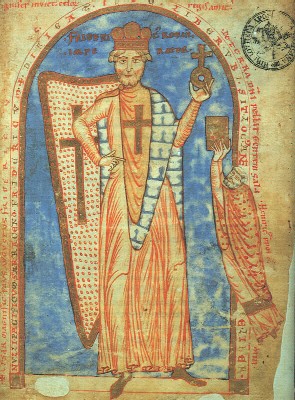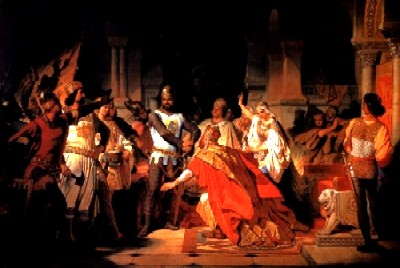
- Frederick was elected
king of Germany on March 4, 1152 and was crowned Holy Roman Emperor
in 1155.
- Frederick I was one of the most famous of German emperors. He was a tall, stalwart man of majestic appearance. He had a long red beard and so the people called him Barbarossa, or Red-Beard.
-The aristocracy had gained power at the expense of the King during the last century, and Frederick had to reorganize the Kingdom to make his own position and the realm itself stronger.
-He waged wars against the opposition in Italy. Since Frederick claimed to be an independent equal of the Popehe said he would not recognize the new Pope Alexander III.
- Pope Alexander was allied to Milan, Tuscany, and Sicily. Frederick fought them for a long time without real results. A treaty was finally signed at Constanz in 1183, whereby the independence of the Italian cities was recognised, though the Emperor was still their overlord.
- In the course of Frederick Barbarossa's reforms, he created a strict feudal form of government. The highest lords, who ranked directly under the Emperor himself, were princes imperii, these were dukes and some counts and bishops. The remaining aristocracy became vassals of the princes imperii. These reforms helped strengthening the Emperor's power during Frederick's time. In the future, however, the princes imperii would form an increasingly powerful social class, who eventually became sovereign princes when the Roman Empire was dissolved.
-Frederick now devoted himself to making Germany a united nation. Two of his nobles had been quarreling for a long time and as a punishment for their conduct each was condemned, with ten of his counts and barons, to carry dogs on his shoulders from one country to another.
-Frederick finally succeeded in keeping the nobles in the different provinces of Germany at peace with one another, and persuaded them to work together for the good of the whole empire. He had no more trouble with them and for many years his reign was peaceful and prosperous.
-Frederick decided to participate in the Third Crusade to the Holy Land. Frederick immediately raised an army of Crusaders in the German Empire and with one hundred and fifty thousand men started for Palestine.
He marched into Asia Minor, attacked the Moslem forces, and defeated them in two great battles.
But before the brave old warrior reached the Holy Land his career was suddenly brought to an end. One day his army was crossing a small bridge over a river in Asia Minor. At a moment when the bridge was crowded with troops Frederick rode up rapidly.
He was impatient to join his son, who was leading the advance guard; and when he found that he could not cross immediately by the bridge, he plunged into the river to swim his horse across. Both horse and rider were swept away by the current. Barbarossa's heavy armor made him helpless and he was drowned.
-His body was recovered and buried at Antioch.
-Frederick Barbarossa is a legendary hero of German history. German folk tales present him as a great ruler and an educated man with chivalry manners. To a great extent this picture of the Emperor is true. He made Germany stronger, only later circumstances disturbed his achievements, weakening the central power and making other European powers relatively stronger.
Barbarossa was so much loved by his people that it was said, "Germany and Frederick Barbarossa are one in the hearts of the Germans." His death caused the greatest grief among the German Crusaders. They had now little heart to fight the infidels and most of them at once returned to Germany.
In the Empire the dead hero was long mourned and for many years the peasants believed that Frederick was not really dead, but was asleep in a cave in the mountains of Germany, with his gallant knights around him. He was supposed to be sitting in his chair of state, with the crown upon his head, his eyes half-closed in slumber, his beard as white as snow and so long that it reached the ground.
Emperor Frederik Barbarossa and Henry the Lion in Chiavenna 1176


"When the ravens cease to fly round the mountain," said the legend, "Barbarossa shall awake and restore Germany to its ancient greatness."
- Frederick I was one of the most famous of German emperors. He was a tall, stalwart man of majestic appearance. He had a long red beard and so the people called him Barbarossa, or Red-Beard.
-The aristocracy had gained power at the expense of the King during the last century, and Frederick had to reorganize the Kingdom to make his own position and the realm itself stronger.
-He waged wars against the opposition in Italy. Since Frederick claimed to be an independent equal of the Popehe said he would not recognize the new Pope Alexander III.
- Pope Alexander was allied to Milan, Tuscany, and Sicily. Frederick fought them for a long time without real results. A treaty was finally signed at Constanz in 1183, whereby the independence of the Italian cities was recognised, though the Emperor was still their overlord.
- In the course of Frederick Barbarossa's reforms, he created a strict feudal form of government. The highest lords, who ranked directly under the Emperor himself, were princes imperii, these were dukes and some counts and bishops. The remaining aristocracy became vassals of the princes imperii. These reforms helped strengthening the Emperor's power during Frederick's time. In the future, however, the princes imperii would form an increasingly powerful social class, who eventually became sovereign princes when the Roman Empire was dissolved.
-Frederick now devoted himself to making Germany a united nation. Two of his nobles had been quarreling for a long time and as a punishment for their conduct each was condemned, with ten of his counts and barons, to carry dogs on his shoulders from one country to another.
-Frederick finally succeeded in keeping the nobles in the different provinces of Germany at peace with one another, and persuaded them to work together for the good of the whole empire. He had no more trouble with them and for many years his reign was peaceful and prosperous.
-Frederick decided to participate in the Third Crusade to the Holy Land. Frederick immediately raised an army of Crusaders in the German Empire and with one hundred and fifty thousand men started for Palestine.
He marched into Asia Minor, attacked the Moslem forces, and defeated them in two great battles.
But before the brave old warrior reached the Holy Land his career was suddenly brought to an end. One day his army was crossing a small bridge over a river in Asia Minor. At a moment when the bridge was crowded with troops Frederick rode up rapidly.
He was impatient to join his son, who was leading the advance guard; and when he found that he could not cross immediately by the bridge, he plunged into the river to swim his horse across. Both horse and rider were swept away by the current. Barbarossa's heavy armor made him helpless and he was drowned.
-His body was recovered and buried at Antioch.
-Frederick Barbarossa is a legendary hero of German history. German folk tales present him as a great ruler and an educated man with chivalry manners. To a great extent this picture of the Emperor is true. He made Germany stronger, only later circumstances disturbed his achievements, weakening the central power and making other European powers relatively stronger.
Barbarossa was so much loved by his people that it was said, "Germany and Frederick Barbarossa are one in the hearts of the Germans." His death caused the greatest grief among the German Crusaders. They had now little heart to fight the infidels and most of them at once returned to Germany.
In the Empire the dead hero was long mourned and for many years the peasants believed that Frederick was not really dead, but was asleep in a cave in the mountains of Germany, with his gallant knights around him. He was supposed to be sitting in his chair of state, with the crown upon his head, his eyes half-closed in slumber, his beard as white as snow and so long that it reached the ground.
Emperor Frederik Barbarossa and Henry the Lion in Chiavenna 1176


"When the ravens cease to fly round the mountain," said the legend, "Barbarossa shall awake and restore Germany to its ancient greatness."